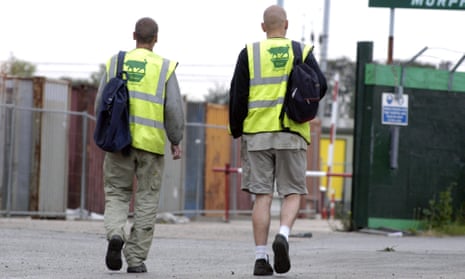Britain’s employers have warned that severe skills shortages are holding back the economy after the latest official figures showed the biggest fall in the number of workers from eastern Europe since modern records began.
The British Chambers of Commerce and the Federation of Small Businesses urged the government to deliver a post-Brexit migration system to meet their needs amid signs that the fall in unemployment in recent years was putting upward pressure on wages.
In its latest update on the state of the labour market, the Office for National Statistics revealed that in the countdown to Brexit the number of workers in the UK from the former Soviet bloc countries fell by 154,000 to 881,000 in the past year.
Official figures covering the summer and early autumn showed a 14.9% drop over the past year in the number of people employed from eight countries – including Poland, Hungary and the Czech Republic – that joined the EU in the early 2000s.
The annual 132,000 drop in the number of workers from the EU as a whole was also unprecedented. Employment from the rest of the world grew by 34,000.
The decline came as the ONS reported a marked increase in earnings growth despite evidence that demand for workers had eased during 2018.
While the number of people employed grew by 23,000 between June and September, the number of jobless people rose by 21,000 to 1.38 million. The unemployment rate edged up from 4% to 4.1%.
With unemployment still close to levels last seen in the mid-1970s, the recent upward pressure on wages continued.
The ONS said total pay, which includes bonuses, was growing at an annual rate of 3% in the three months ending in September – the fastest growth rate in three years. Adjusted for inflation, earnings were up by 0.9%, a rate not exceeded since late 2016.
Annual growth in regular pay, which strips out bonuses, reached 3.2%, a rate not seen since the immediate aftermath of the bankruptcy of Lehman Brothers in September 2008, which pushed the global economy into its deepest recession since the second world war.
Suren Thiru, head of economics at the BCC said: “There is clear evidence of a deep-rooted skills gap across the UK which is constraining business growth. To plug skills shortages, the government must deliver a post-Brexit migration system that enables access to the skills needed at all levels to help grow our economy.”
A fall in the value of the pound since the Brexit referendum and strong growth in their own economies has made the UK less attractive to workers from eastern Europe. Over the same period, the number of EU nationals from western European countries working in the UK has risen by almost 50,000.
Stephen Clarke, senior economic analyst at the Resolution Foundation, said: “The sharp fall in EU migrant workers over the last year shows that Britain’s labour market is already changing ahead of its exit from the EU, and long before its post-Brexit migration plan is in place.
“Firms who employ a large share of migrant workers need to think now about adjusting to a lower migration environment, in terms of the workers they employ, what they produce and how they operate.”
The Liberal Democrat home affairs spokesman, Ed Davey, said: “Even before we’ve left the EU, we’re seeing a Brexodus that is bad for British businesses and especially bad for our public services.
Mike Cherry, the national chairman of the FSB, said: “One in five small employers rely on staff from the EU. With net migration from Europe falling, it’s increasingly a challenge for firms to recruit from the vital pool of EU talent based here in the UK. If we don’t see a pro-business withdrawal agreement signed before the month is out, this challenge will become even more pronounced and entrenched. The Brexit clock is ticking.
“It’s critical to remember that 95% of small firms have never made use of the UK’s points-based immigration system. If they’re lumbered with complex paperwork to bring in EU staff post-Brexit that will cause a significant drag on the billions they contribute to the economy each year.”
